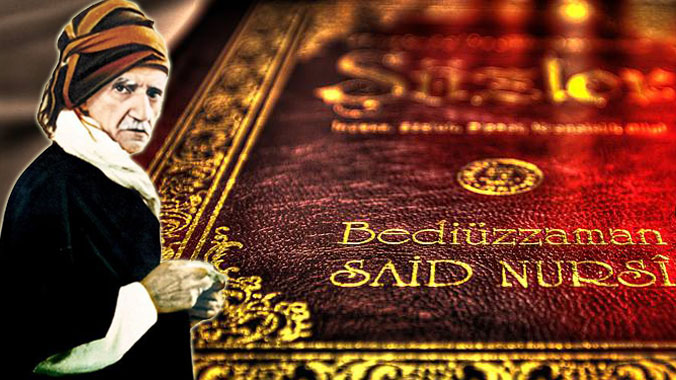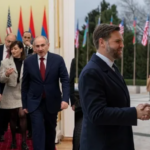There has been a great deal of criticism and debate on a global scale as a result of the continuous bloodshed in Gaza and Lebanon, which is mostly fueled by the acts of the Israeli military. For many, these acts of aggression represent more than just territorial disputes or political conflict—they reflect a deeper spiritual and moral crisis that resonates with historical and religious narratives. This narrative may be found in the teachings of the renowned Islamic scholar Said Nursi. According to Nursi, before the return of Jesus, humanity will be confronted with a significant moral and spiritual conflict when it comes to the conflict between oppression and justice (Nüzul-i İsa). This article explores how Israeli actions in Gaza and Lebanon might be interpreted as part of this larger eschatological process, as envisioned by Nursi.
Nursi’s Eschatology: Justice, Oppression, and the Return of Jesus
Said Nursi (1877–1960) is one of the most influential Islamic scholars of the 20th century, particularly known for his theological work, Risale-i Nur. His teachings encompass a wide array of topics, but his eschatological views, particularly concerning the return of Jesus and the ultimate confrontation between good and evil, are central to his religious philosophy.
Nursi emphasized that the world would become entangled in a spiritual and moral crisis where materialism, irreligion, and injustice would dominate. He predicted that the forces of oppression would grow stronger, leading to increased suffering, inequality, and warfare. This is the environment in which the return of Jesus plays a significant role: Jesus will not return as a new prophet but rather as a figure from the Islamic Ummah (community) who will battle with believers to restore justice and righteousness.
This eschatological vision is important when considering the current geopolitical crises, particularly the Israeli-Palestinian conflict and the repeated aggression in Lebanon. These acts of violence and their global implications resonate deeply with the moral and spiritual struggle that Nursi foresaw. The oppression faced by Palestinians and Lebanese, characterized by military occupation, displacement, and humanitarian crises, can be viewed as symptomatic of the broader battle between materialism and divine justice.
Israeli Aggression as Part of the Moral Crisis
Many human rights organizations have brought claims of war crimes and genocide in relation to the Israeli military’s activities in Gaza and Lebanon. These actions have frequently been characterized as being disproportionate. The systemic nature of the oppression—whether through land confiscation, bombing civilian areas, or economic blockades—mirrors Nursi’s description of a world order increasingly dominated by materialism, irreligion, and the oppression of the weak by the powerful.
It is the contention of Nursi’s theological framework that such oppression is not only a matter of political or military issue but rather has its origins deeply ingrained in a spiritual malady. Through his works, Nursi expressed his concern that humanity would continue to deviate further from divine guidance, which would lead to the establishment of oppressive systems that would afflict those who were faithful and those who were marginalized The suffering of Palestinians and Lebanese at the hands of a more powerful Israeli military, backed by global powers, might be interpreted as an embodiment of this eschatological narrative.
The Israeli-Palestinian and Israeli-Lebanese conflicts are not simply isolated struggles over territory; they reflect broader questions about justice, human rights, and the moral integrity of modern civilization. The imbalance of power in these conflicts, where a technologically advanced military power exerts force over weaker populations, fits into Nursi’s vision of the forces of materialism and injustice gaining dominance before a divine reckoning.
The Role of Jesus in Nursi’s Eschatology
One of the most significant aspects of Nursi’s eschatology is the role of Jesus Christ in overcoming these injustices. In both Islamic and Christian eschatology, Jesus (Isa in Arabic) is a key figure in the end times. However, Nursi’s interpretation of Jesus’ return is uniquely tied to the struggle against oppression and materialism. According to Nursi, Jesus will return not as a new prophet but as part of the Islamic community, helping to restore justice and truth in a world deeply divided by material pursuits and moral corruption.
Nursi emphasizes that Jesus’ return will not establish a new religion but will reinforce the principles of Islam. His mission will be to unite the followers of monotheistic faiths (especially Muslims and Christians) against forces of deception and tyranny, symbolized in Islamic eschatology by the figure of the Antichrist (Deccal). Nursi believed that the Antichrist represented not just a literal figure but also the global systems of oppression, materialism, and falsehood that lead humanity away from divine justice.
In the context of today’s violence in Gaza and Lebanon, some might interpret the escalation of oppression as part of the eschatological process Nursi described. The ongoing suffering of the Palestinians, with their homes destroyed, their lands occupied, and their people systematically marginalized, is emblematic of the kind of injustice that Nursi predicted would intensify before the eventual divine intervention.
Convergence of Islam and Christianity in the End Times
A unique element of Nursi’s eschatology is his belief in the eventual convergence of Islam and Christianity in their mutual fight against oppression. Nursi envisioned that, in the end times, true Christians and Muslims would unite under the banner of monotheism to defeat the forces of falsehood and materialism. He argued that Jesus’ return would herald a new era in which the true essence of Christianity would align with Islamic principles, particularly in their shared belief in divine justice and opposition to tyranny.
In the context of Israeli aggression, this convergence might be viewed symbolically in the way global communities are rallying against oppression. While the alliance Nursi spoke of may not yet be fully realized, the global solidarity shown by various religious and secular groups in condemning the violence in Gaza and Lebanon reflects a growing recognition of the need to stand against injustice.
Nursi believed that, as the world moves closer to the end times, the forces of good—embodied in the alliance between true Christians and Muslims—would gather strength to combat the systems of materialism and exploitation. The moral outrage against Israeli aggression and the calls for justice for Palestinians and Lebanese could be seen as an early manifestation of this eschatological alliance.
Israeli Aggression as a Reflection of Global Materialism
The violence in Gaza and Lebanon can also be interpreted as part of the broader materialistic and irreligious world order that Nursi critiqued. For Nursi, modern civilization’s reliance on material power, at the expense of moral and spiritual values, is a hallmark of the age leading up to the end times. The Israeli state, with its powerful military and technological dominance, represents the type of materialism that Nursi warned would overshadow divine principles of justice and righteousness.
The Israeli government’s actions—often justified in terms of security and political interests—are reflective of a global system that prioritizes power, wealth, and territorial control over human dignity and moral responsibility. In Nursi’s vision, these materialistic values are directly opposed to the divine justice that Jesus will restore when he returns to confront these global systems of oppression.
This moral decay, as seen in the world’s often inadequate response to the suffering of Palestinians and Lebanese, is part of the larger existential struggle Nursi predicted. The global community’s failure to hold powerful actors accountable for their crimes against weaker populations reflects the dominance of material interests over justice and compassion.
Conclusion: The Eschatological Struggle for Justice and Peace
Said Nursi’s eschatological teachings offer a profound and spiritually insightful framework through which to interpret the ongoing Israeli aggression in Gaza and Lebanon. Nursi’s vision of a world divided between the forces of materialism and divine justice resonates deeply with the current geopolitical reality in the Middle East. The suffering of Palestinians and Lebanese, the international community’s failure to resolve the conflict, and the disproportionate use of military force can all be seen as part of the larger moral and spiritual crisis Nursi described.
In Nursi’s framework, the violence in Gaza and Lebanon is not just a political issue but part of a broader eschatological process in which injustice will be confronted by divine justice. As Nursi predicted, this global moral struggle will ultimately culminate in the return of Jesus, who will unite true believers to restore peace and righteousness to a world overcome by oppression and falsehood.
While Nursi’s eschatological vision may offer hope for a future where justice prevails, it also serves as a reminder of the urgent need for action. The suffering in Gaza and Lebanon must not be ignored, and the international community, inspired by principles of justice and humanity, must work toward a peaceful resolution that honors the dignity and rights of all people. In this sense, the eschatological struggle is not just a distant future event but a call for moral responsibility in the present.
By: GEOPOLIST Editorial Team







